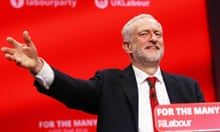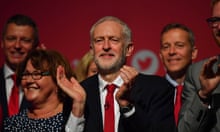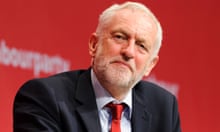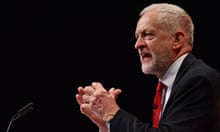Labour conference has voted to back the party’s official policy on Brexit, after its ruling body released an eleventh-hour motion to counter accusations the party was not allowing delegates a meaningful say.
The national executive committee published the document after the party faced criticism from some of its own MPs for avoiding a vote on the UK’s membership of the single market.
The one-and-a-half page statement deals with the UK’s future relationship with the EU by saying: “Labour is clear that we need tariff- and impediment-free trading relationship with the EU. Labour’s priority is an outcome that puts jobs, living standards and the economy first.
“The precise institutional form of the new trading and customs relationship needs to be determined by negotiation. Labour will not support any future arrangements that see the introduction of a hard border or which restricts free movement between Ireland and the UK.”
Pro-EU party members and MPs had hoped delegates would support their bid for a vote on more divisive issues, including free movement and permanent membership of the single market, which polls suggest have widespread support among members.
But the party leadership was spared any potentially embarrassing split after members picked eight “contemporary motions” for debate and vote, including in areas such as social care, but not on Brexit, encouraged by the pro-Corbyn grassroots movement Momentum.
Earlier, John McDonnell, the shadow chancellor, dismissed controversy over the decision to exclude Brexit from a series of debates, saying it was the decision of members, who wanted to “build a consensus” on the issue.
He said Labour delegates had chosen instead to select debates on “bread and butter issues” such as health and housing, and did not wish to divide the party over Brexit.
Speaking on BBC1’s Breakfast programme, McDonnell rejected the idea that the issue was being ignored. “I think you’ve got this wrong,” he said. “There will be a debate about Brexit, a very thorough one. Keir Starmer will be introducing it, there will be the normal report from the national executive committee, and if people want to vote on that they can.
“But the way we organise conference now, the delegates themselves, no longer the leadership, decide on what motions they’ll debate, and that’s what the delegates have done. They’ve chosen other issues.”
In his speech on Monday, Starmer trod a careful line on Labour’s position on the single market, saying the party in government would build “a new, progressive partnership with the EU” that mirrored single market benefits. “Options for achieving this should not be swept off the table,” he said.
Starmer said remaining in a customs union in the EU was “a possible end destination for Labour” and said the party would be open-minded in its approach to the single market.
“We are flexible as to whether the benefits of the single market are best retained by negotiating a new single market relationship or by working up from a bespoke trade deal,” he said. “No rash, ideological red lines preventing a sensible deal. Labour are now the grownups in the room.”
Speaking later at an event with Labour’s MEPs, Starmer said he believed a Brexit deal could be achieved that would be as good as being in the EU. “I do not want to get in to the approach that says: ‘It will never be as good as it was on 23 June 2016,’” he said. “I fundamentally reject that, I think if we work hard we can do better than that.
“I’ve got a six-year-old girl and a nine-year-old boy and I am not going to let them grow up with their dad saying to them: ‘It will never be as good as it was.’”
McDonnell and the Labour leader, Jeremy Corbyn, have kept a more ambiguous stance on the single market, arguing for continued membership during a transition period but committing only to seeking access to it once Brexit is complete.
McDonnell argued that delegates had not chosen Brexit as a topic for a binding vote because they did not wish to split Labour over the issue, saying: “On Brexit, the interesting thing is people are trying to build a consensus now, and not divide the party. And also, what I think is interesting, build a consensus not just in our party but within our communities. I think that’s the nature of the decisions.”
Momentum was thought to be highly influential in the result of the ballot because it emailed members to recommend four topics that were chosen.
Asked about this, McDonnell said: “All the groups send round their advice to delegates on what they think should be the priorities to be debated, whether it’s Momentum or Labour First or Progress or whatever.
“But it’s the delegates themselves that decide. This is the nature of our party now. We’re saying that it’s the rank-and-file membership who will take the decisions and control the agenda at conference, not the leadership any more.”
Asked about his idea of maintaining some access to a “reformed” single market, including changes to freedom of movement, McDonnell said he hoped this would be possible.
“We believe we can have a relationship with the single market that we think will overcome a lot of the perceived disbenefits that were highlighted during the referendum campaign, and gain and maintain a lot of the existing benefits. Again, that’s to be negotiated,” he said.
On BBC Radio 4’s Today programme, McDonnell said it could not be guaranteed that Labour’s position on the single market would be finalised if there was an election in six months.
“We’re building that answer now, but we’ve got to have consensus,” he said. “We can’t be in a situation where we try to impose a solution on the British people.”
Labour was working as fast as it could to “define the new relationship we’ll have with EU”, he said, including consultations with business and communities. The goal was, he said, “a compromise within the community that brings us the benefits of the EU, as they are, and overcomes some of the disbenefits”.
He added: “We think we can build a compromise and consensus, The country was split down the middle – we’ve got to try to bring the country back together again. We think we’re the only party that can do that.”
The Labour London mayor, Sadiq Khan, said he wanted to see the UK remain permanently in the single market after Brexit. “I want us to continue to be members of the single market,” he told Today. “If we can’t achieve [this], the less best scenario is us having access to the single market.”









